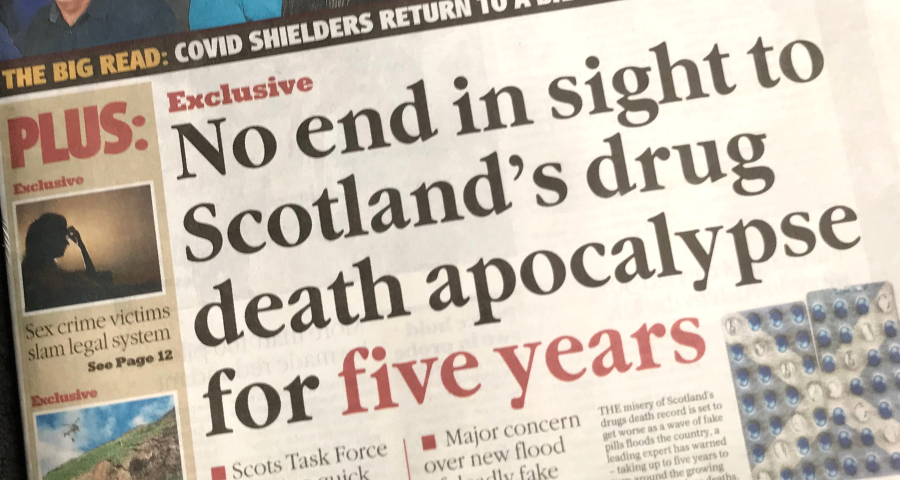
In an article in The Herald on the 16th of August, it was claimed that there is “no quick fix” to the rising toll of drug-related deaths in Scotland and that it may be some years before there is a considerable reduction.
Scottish Drugs Forum were invited to respond to the statement. The below piece was written by SDF’s CEO, David Liddell, and published alongside the original article in the printed edition of the newspaper.

Everyone knows that Scotland’s drug overdose deaths are at a record high and are amongst the highest rates in the world.
The perception seems to be that the Government’s Drug Death Task Force is starting from scratch – that it should investigate what is going on; decide what should be done and lead the service response and cultural change required to address this shameful and tragic issue.
Actually, this is not all required – although there is certainly a need to drive cultural change – particularly at service level. We know what is going on and, in our heart of hearts, we know what needs done. The problem is that there is a misunderstanding of the situation that Scotland is in and the way we might escape it.
The current drug strategy has its strengths but it fails to identify and address the one key issue regarding drug-related deaths – that in Scotland we have around 35% of people with a drug problem in treatment – around half the rate of the rest of the UK. What makes Scotland exceptional and our drug-related death problem is explained in that single statistic.
The vast majority of deaths involve people using opiates – almost always along with other drugs or alcohol. The best evidenced way to reduce risk is engaging people in long term medication assisted treatment – prescribing buprenorphine or methadone while offering support with health and social issues.
The clear evidence is that Scotland needs to get people into high standard treatment quickly and ensure they are not pushed out of this treatment – the recent Dundee Drug Commission Report highlight the tragically high rate of ‘unplanned discharges’.
This, unfortunately, is the reality that Scotland has resisted for 35 years. We have instead stigmatised treatment, particularly methadone. In fact, we have stigmatised people who use drugs, people with a drug problem and people in drug treatment. There seems no escape for people. And people die as a result of this stigma. It dissuades people from disclosing their drug problem and presenting for treatment. It has also meant that treatment services remain dislocated from health and other services like ghettos within the NHS and social work departments – underinvested and underdeveloped. A change of culture is required – we need a strategy that celebrates, invests in and improves treatment. That treatment needs to link people to help with other health issues, housing and employment.
The Task Force’s existence should not be an excuse for other people to wait and do nothing. There are obvious necessary actions we should be taking now. We need better distribution of naloxone to drug users and the wider public. We need to ensure people in treatment are in therapeutic doses of the medication that best suits them – as we would for any other patient group. We need better engagement with people with a drug problem, their friends and families that clearly communicates that across Scotland that the lives of people who use drugs matter and that the state will act to protect them – that shouldn’t be in doubt.
There is room for optimism. The COVID19 pandemic has forced changes that should have happened years ago in allowing people to keep their medication at home. This allows them to avoid running a gauntlet of drug dealers on the way to the pharmacist every day. Let’s resolve that we will never revert to having that stigmatised and largely unnecessary system as our default treatment regime.
The Task Force can work on longer term issues. One fundamental question is how do we stop children in Scotland experiencing childhoods that produce problems in adulthood – why the abuse, neglect and trauma? What supports are parents and families needing? Can we do more to ensure people stay in and benefit from education and divert people from the criminal justice system?
The existing evidence and all the lived experience tell us exactly what changes are required now to address Scotland’s shocking levels of problem drug use and overdose deaths. Now we need the leadership and the will to change.
